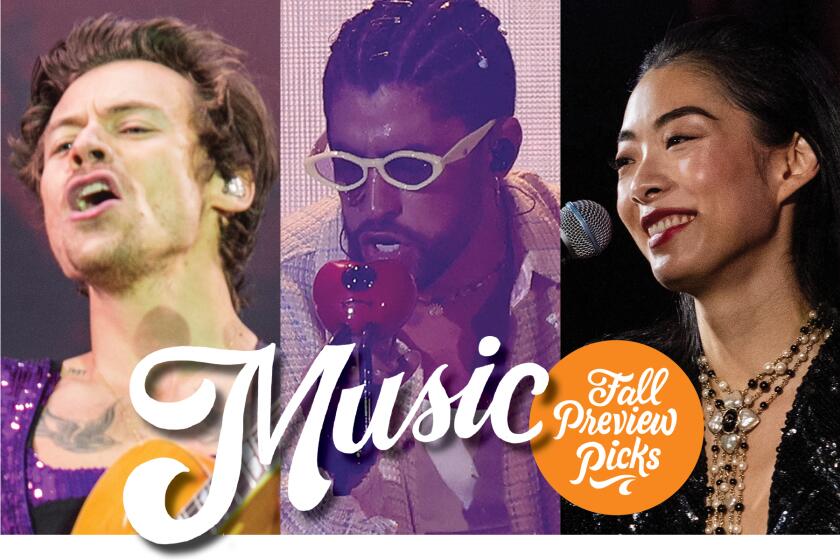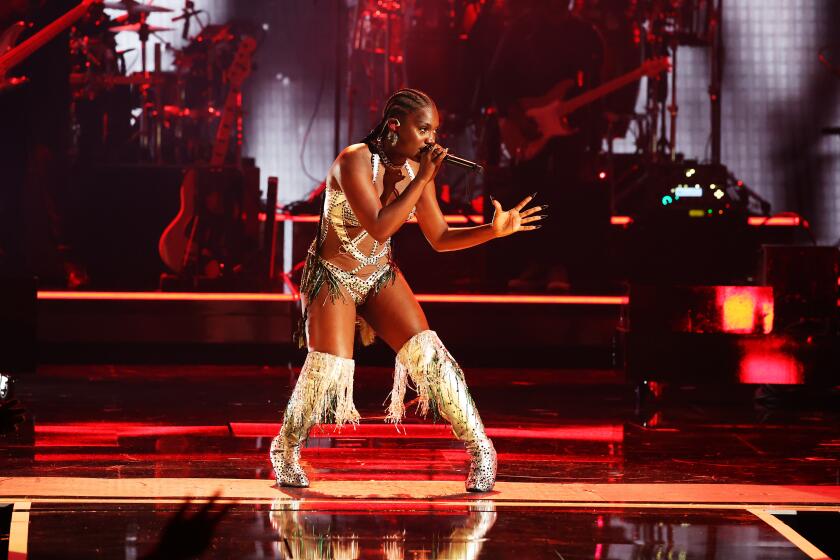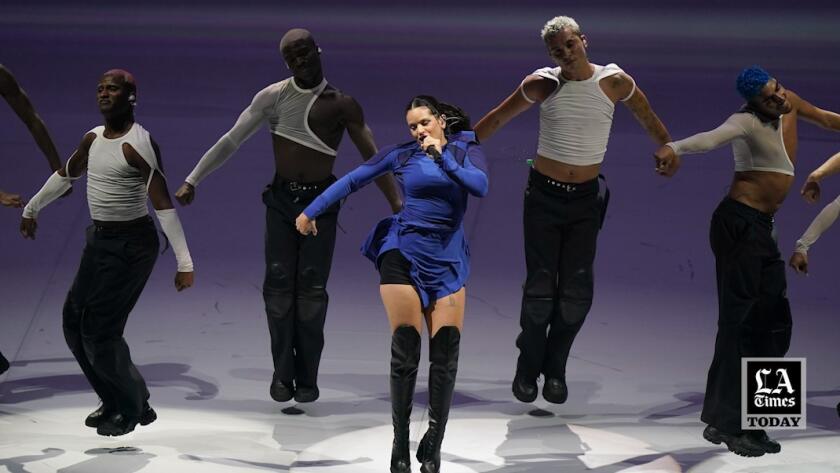- Share via
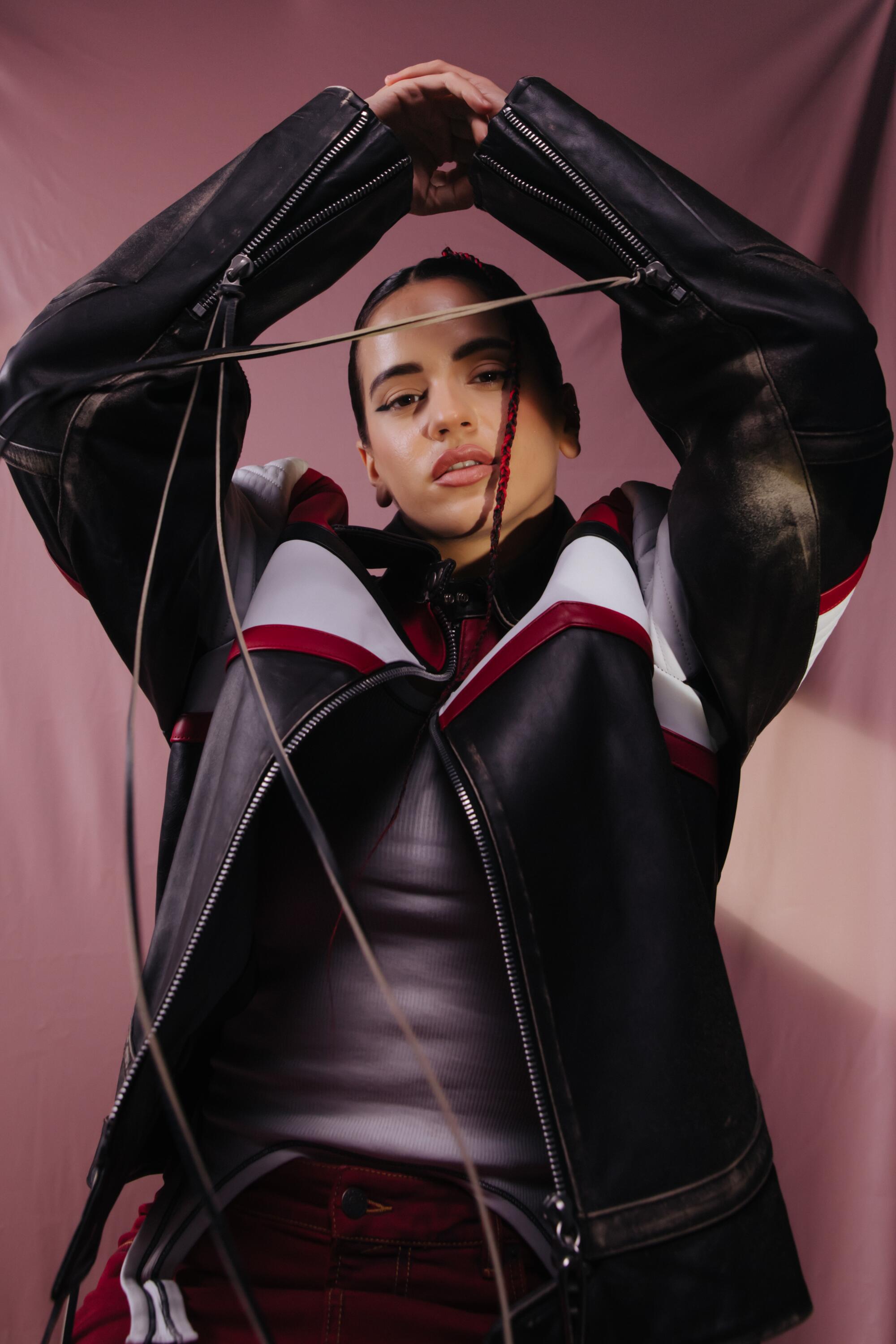
MEXICO CITY — “It was like I almost drowned!”
Inside one of Mexico City’s posh five-star hotels, Rosalía sinks into a cushy office chair across from me, already winded on the third day of her Latin American tour, in support of her universally acclaimed album, “Motomami.”
If it wasn’t from the altitude sickness that reared its head during her first night in Mexico — “I thought I needed an oxygen tank,” she said — it was from the reception the 29-year-old Spanish pop star received inside the capital city’s Benito Juárez International Airport, where she was ambushed by a swarm of screaming fans and photographers.
For what felt like hours, she said, she hid behind her curtain of dark tresses, as her bodyguard pushed through the crowd and shuffled her into a black car. “It just hit me,” she said, “what it meant to my fans that I came from so far away.”
Donning a space bun hairdo, baggy blue jeans and a Harley-Davidson shirt with flames on the sleeves, Rosalía cradled a fan-bespoke Dr. Simi plush doll, which Mexican fans have taken to toss at their favorite singers during concerts. My Chemical Romance, the Killers and Gorillaz have all amassed their own Dr. Simi collections; last month, Lady Gaga narrowly dodged a Dr. Simi to the face. Rosalía had collected at least five so far.
From artists redefining the term ‘rock star’ like Harry Styles and Steve Lacy, to OG’s such as Stevie Nicks and Elton John, fall is filled with must-hear music.
“This one has my tattoos,” she said, comparing the inside of the doll’s hands to her own — inked with fashionably worn, scraggly letters spelling out “Motomami.” On the doll’s thigh, a fan reproduced Rosalía’s garter belt tattoo, a tribute to the Austrian feminist performance artist Valie Export.
The concept of “Motomami,” Rosalía explained, was first inspired by her mother Pilar Tobella: her chief business advisor, as well as an avid biker, who could expertly zip through the alleys and hills of Sant Esteve Sesrovires, Rosalía’s birthplace, in Catalonia. Moreover, Rosalía added, “Motomami” is the incarnation of her own “drive for artistic and sexual liberation.”
Released in March, “Motomami” put the gas on Rosalía’s ascent to worldwide pop stardom. A survey of flamenco and Caribbean heritage music like bachata and reggaetón, modulated through a glitchy funhouse filter of hyper-pop, the record debuted on the top of Spotify’s global albums chart. Featuring guest stars the Weeknd, James Blake and the Neptunes, “Motomami” became the year’s most critically acclaimed album on Metacritic — even topping Beyoncé’s celebrated “Renaissance.”
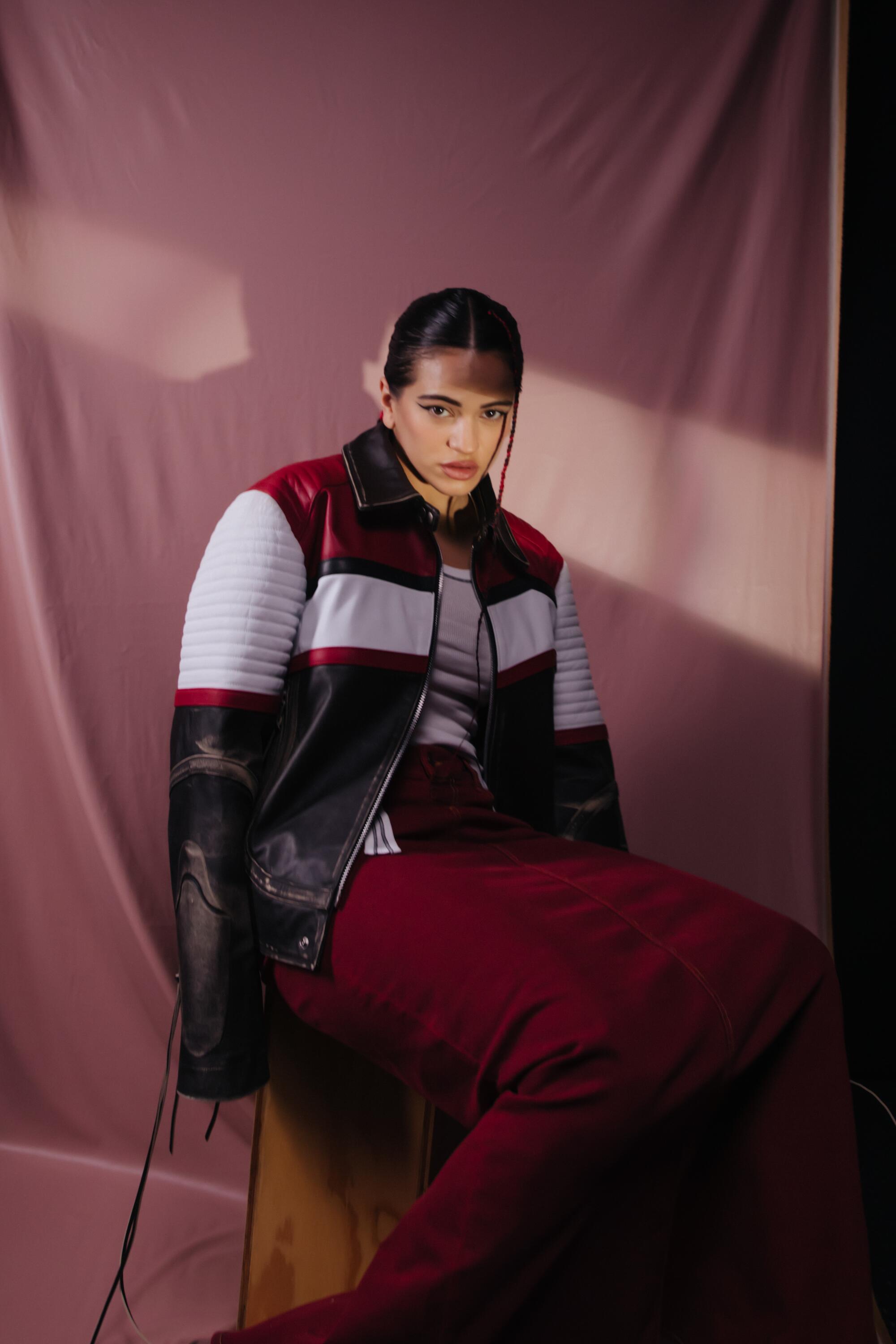
Rosalía already set the bar high with her 2018 sophomore release, a rousing flamenco-pop fusion dubbed “El Mal Querer,” which loosely translates to “a toxic love.” Released on Sony Latin, it actually began as her baccalaureate thesis project at the Superior Catalonia School of Music: a musical retelling of the 13th century Occitan romance “Flamenca.”
In 2019, “El Mal Querer” won the Latin Grammy for album of the year; in 2020, Rosalía claimed the Grammy for Latin rock, urban or alternative album, beating out reggaetón superstars Bad Bunny and J Balvin, who, with the advent of streaming services like Spotify and Apple Music, have led an unprecedented Hispanic takeover of pop charts around the world.
Rosalía’s accolades grabbed the attention of Grammy-winning producer and composer Noah Goldstein, who oversaw the Kanye West albums “My Beautiful Dark Twisted Fantasy” and “Yeezus.” He first met Rosalía in 2019, while she recorded a track for one of his clients at Electric Lady Studios in New York; after he sat in on a session with one of her producers, David Rodríguez, Rosalía’s manager, Rebeca León, asked Goldstein to work on “Motomami.”
“Rosalía is the truth,” Goldstein told The Times. “I was floored when I first heard her sing. She can go light and airy, or sometimes, beautiful and aggressive.” As an example, he cites her vocal melisma on the flamenco track, “Bulerías” — “nobody else in pop can touch that,” he said.
“She’s a creative genius,” he added. “I’ve been doing this for 20 years, so at this point, I just know when I see it. The artists that I work with fight to find the balance between something that can be appreciated by a mass audience, but also challenge them and push things forward. They don’t compromise their vision. Kanye’s the same way. To me, the best art makes all of us question traditions. Rosalía is a progressive artist.”

At the first of two sold-out concerts at Auditorio Nacional in Mexico City, the buzz of 10,000 fans, some festooned in leather biker chic, swelled to a roar as Rosalía emerged in a blue dress outfitted with shoulder pads, smacking on an invisible piece of chewing gum.
This has become her go-to performance routine for the song “Bizcochito,” a plinky feminist communiqué of a reggaetón track that inspired a chewing gum challenge on TikTok. On behalf of the objectified female subjects of hip-hop songs, she declared in Spanish, “I am not, nor will I ever be, your babycakes!,” as thousands shrieked along.
TikTok has served as the artist’s primary canvas as of late. It’s where she tests many of her looks, and where in March she broadcast a sensational live performance of “Motomami,” a popular strategy among the most internet-savvy of pop stars. The social platform directly inspired her Mexico City stage setup: a stark white background that heightened the contrast of her undulating silhouette, as she and her dancers swanned, twerked and wrestled each other into knots.
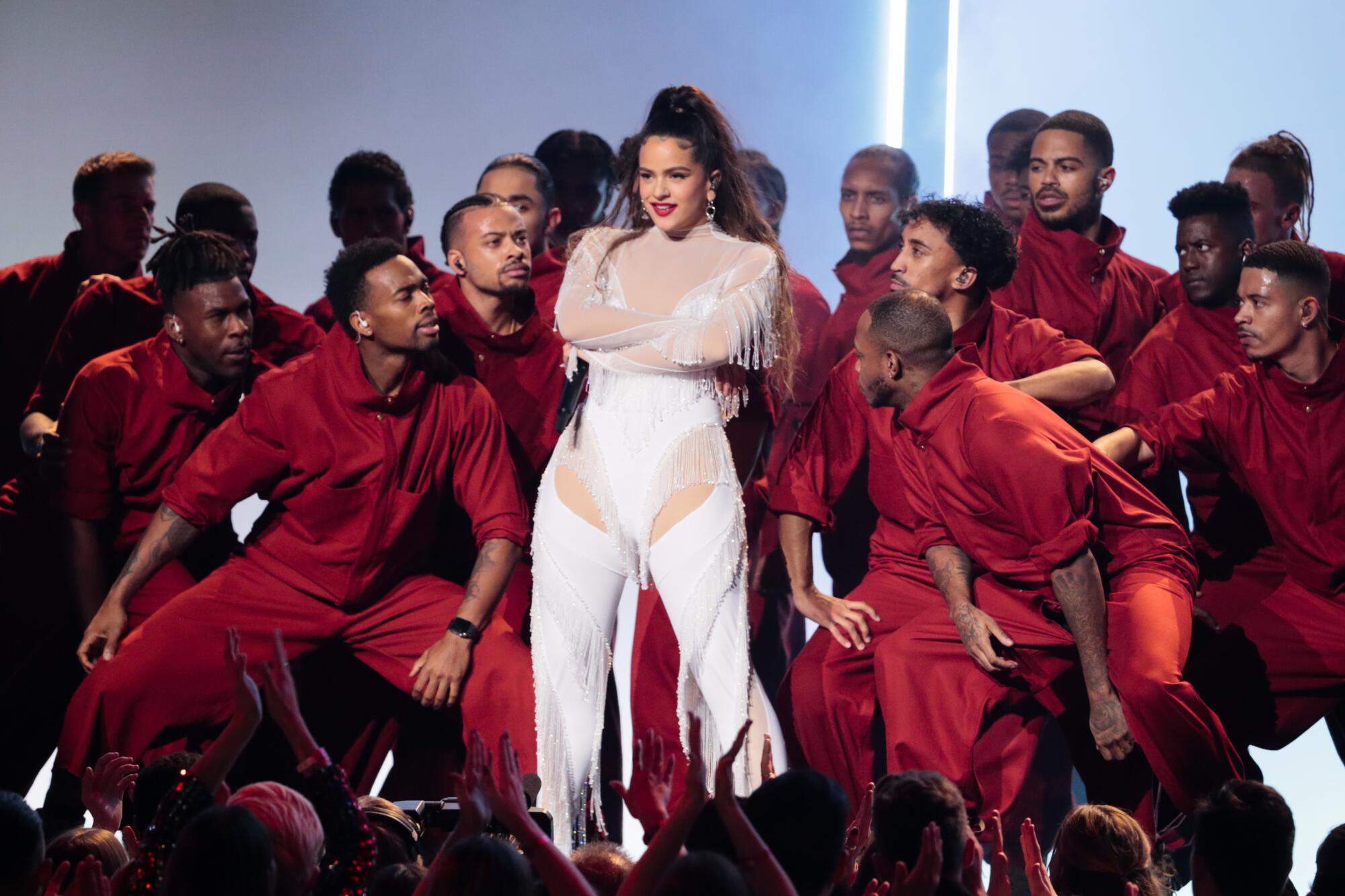
Rosalía’s backup dancers — an international, all-male modern dance crew, choreographed by Mecnun Giasar and the Jacob Jonas company — circled one another with cameras in hand, making sure to zoom in on the beads of sweat emanating from each others’ pores. Their images were projected onto large screens designed to look like iPhones; in turn, fans recorded the scenes on their own camera phones. “People who see the world through their eyes now see the world through their screens,” she explained after the show.
At the core of the record’s identity, said Rosalía, is the fragmented chaos of the internet that she grew up on. If a bolero like “Delirio de Grandeza” seems discordant when juxtaposed with the industrial furor of “CUUUUuuuuuute,” that’s because it’s supposed to be; she says the microblogging site Tumblr was in part her inspiration for the diaristic sound collage that became “Motomami.”
“It’s because of the internet that the world today is so globalized,” said Rosalía, who herself took inspiration from her online discovery of records by Björk and M.I.A. “Globalization [means] artists are being exposed to so many things from so many different places. It makes art more about the journey than the destination. ... I really identify with that.”
Doechii never thought she’d get out of her hometown of Tampa. Now she’s readying her debut LP for TDE, the label that helped make Kendrick Lamar and SZA stars.
Like its creator, “Motomami” is well-traveled. In the three years she spent writing and recording the album, Rosalía jetted between studios in Miami, Puerto Rico and Los Angeles, where she lived through most of the pandemic. She also passed some time in New York with enigmatic singer-songwriter Frank Ocean, who, as she recalls in the track “Saoko,” told her to “crack open the world like a nut.” She then stayed with rapper Tokischa in the Dominican Republic, where they wrote the songs “Linda” and “La Combi Versace” and enjoyed a plantain lasagna dish called pastelón, courtesy of Tokischa’s mother.
Some of those travels were shared with her boyfriend of almost three years, Puerto Rican pop star Rauw Alejandro. Although Rosalía and Alejandro collaborate on music often — like her made-for-TikTok earworm “Chicken Teriyaki,” on which Alejandro is a co-writer — she says they’re holding off on releasing anything as a duo.
“To get feelings mixed up in business is so tricky,” she says. “Our connection is very strong, but we’re still learning each other and building a foundation.”
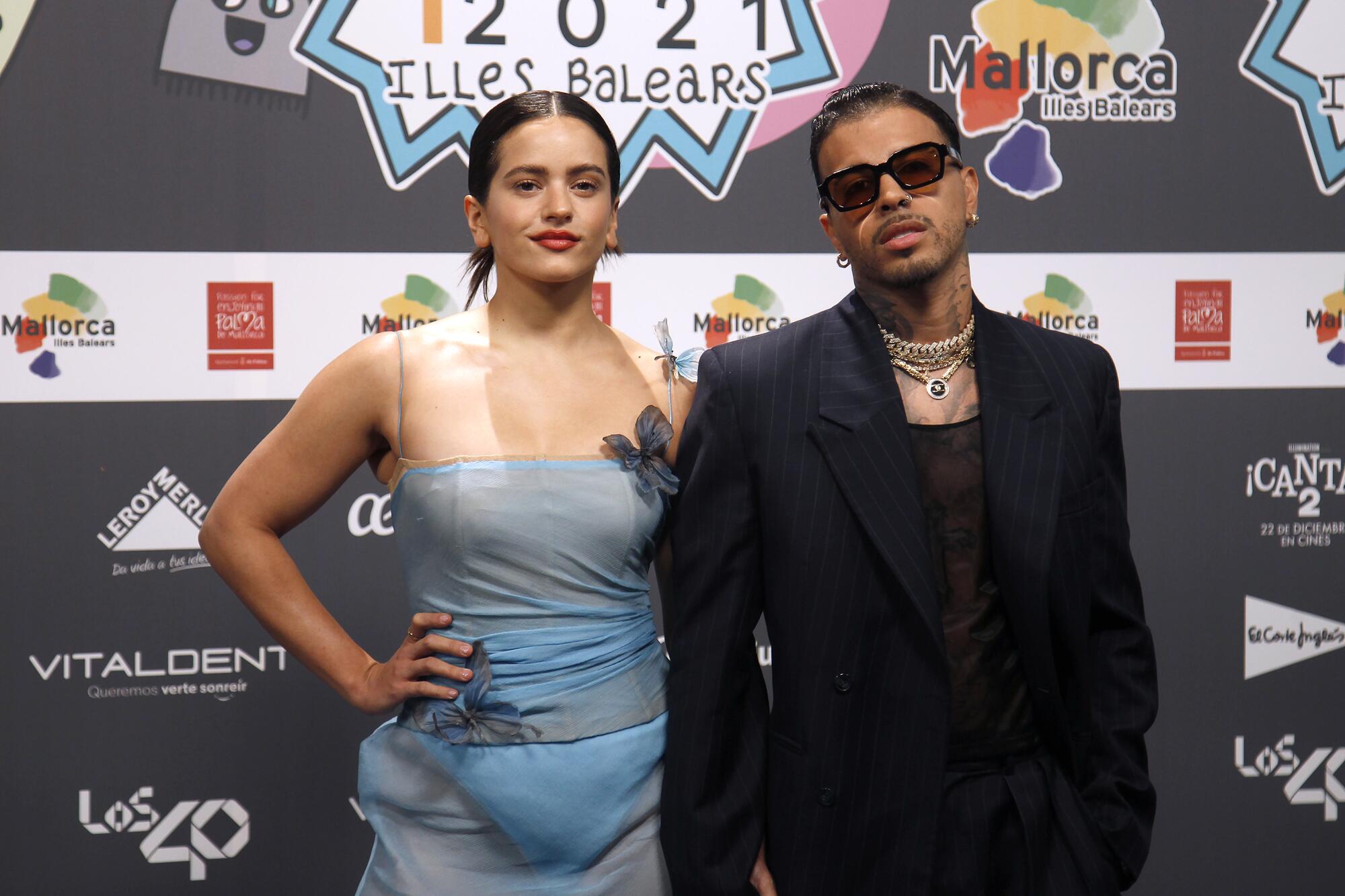
Although she was born and raised in Catalonia — home to a separatist movement that’s been fighting for autonomy from Spain for over a century — Rosalía has been embraced by many in Spain as a poster girl for the country’s burgeoning cultural renaissance. She made her first movie appearance by singing in “Pain and Glory,” the 2019 film from Spanish director Pedro Almódovar, who frequents her concerts. Musicians such as Don Patricio, as well as Catalan artist Rigoberta Bandini, have also lauded her for elevating the country’s music to new heights.
Yet to her critics, Rosalía has become an avatar for Spanish colonization, which has left behind an unrelenting caste system in Latin America and its other former colonies — one that continues to privilege artists and others with white European ancestry.
Whereas Rosalía cites the differences between people as points of inspiration for her art — take her interest in flamenco, which she says was sparked from the Andalusian communities in her hometown, or the distinctly Black Caribbean genres like reggaetón and bachata, which she reveled in at parties as a teen girl — others point out that the very groups she’s inspired by are still not afforded the same level of institutional support or commercial value as white artists.
These are observations that Rosalía does not contest, but during her time in Latin America, she‘s been forced to face them more soberly. “I don’t feel proud of what my ancestors have done, or proud at all of that past,” she said. “I think we should be conscious about that past. I want us to look forward to a better future. I come here with the utmost respect and will to learn from people.”
It’s this mind-set that moved bachata superstar Romeo Santos to collaborate with Rosalía on his new album, “Formula Vol. 3.” She and Santos co-wrote the latest single, “El Pañuelo,” a classic bachata number suffused with Rosalía’s nimble, vocal acrobatics.
“I respect [her] creative space, her interpretation, her essence,” Santos told The Times. “We don’t need to change our language, our rhythms, or our essence to fit in. Artists like Bad Bunny and Rosalía, they make me proud.”

To her credit, Rosalía rarely accepts such praise without citing her sources. Much like an academic, she peppers most of her songs with the names of her influences, as if to build a bibliography for her listeners, in hopes that they may absorb what she has from them. For example, she shouts out the Puerto Rican reggaetón duo Plan B on “Candy,” and credits Dominican singer Omega for inspiring the “violent mambo” of her latest single, “Despechá.”
“I wouldn’t have gotten where I am had I not studied flamenco,” she said. “Or boleros, soul, jazz, bossa nova. I tried singing in Portuguese to better understand bossa nova. Then I tried singing in English to better understand American jazz standards. I studied bachata for years before I got lucky enough to record with Romeo Santos!”
Rosalía’s world tour will continue in the U.S. and Puerto Rico this month, starting with her Sept. 9 show in San Juan. This run will include two nights at the YouTube Theater in Inglewood, Oct. 7 and 8.
“I study, and I bring my personal point of view into what I’ve learned,” she concluded. “That’s why I do this job. That’s why I make music in many styles, from other places — it leads to more expressions. It makes me a better artist. To learn from people is the biggest blessing. And to share it, too.”
- Share via
Watch L.A. Times Today at 7 p.m. on Spectrum News 1 on Channel 1 or live stream on the Spectrum News App. Palos Verdes Peninsula and Orange County viewers can watch on Cox Systems on channel 99.
More to Read
The biggest entertainment stories
Get our big stories about Hollywood, film, television, music, arts, culture and more right in your inbox as soon as they publish.
You may occasionally receive promotional content from the Los Angeles Times.
